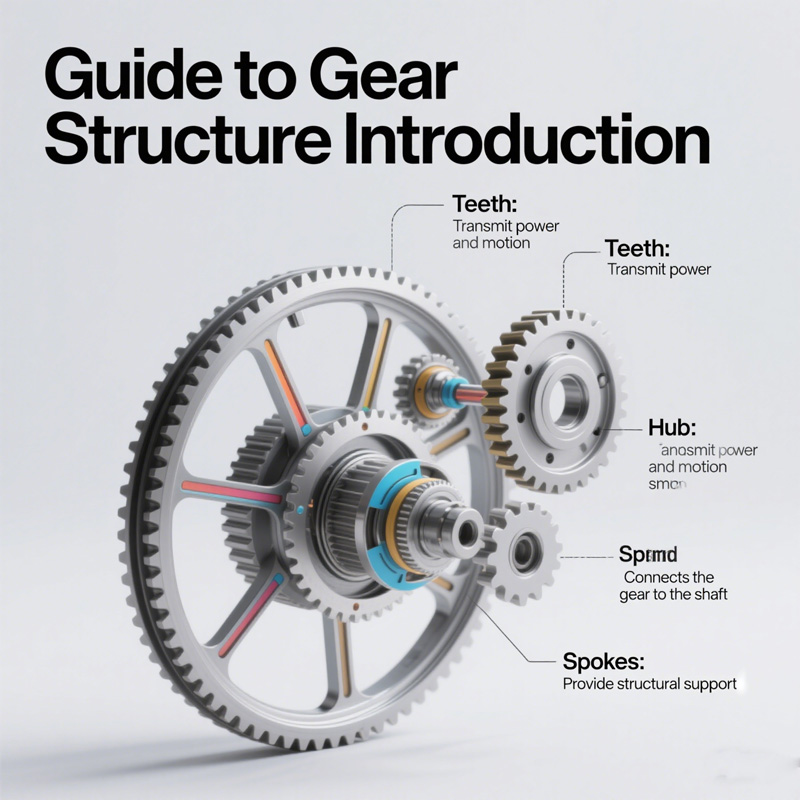Guide To Gear Structure Introduction
Gears are essential mechanical components that transmit torque and motion between rotating shafts, playing a critical role in industries like automotive, aerospace, manufacturing, and robotics. Depending on their design—such as internal gears, external gear rings, spur gears, helical gears, bevel gears, and worm gears—each type serves a specific function in the power transmission system.
The forging process significantly enhances gear strength and durability, surpassing that of traditional machined gears. This article will provide an in-depth exploration of various gear types, their applications, and the industrial advantages of forged gears, highlighting why they are the preferred choice for high-performance systems.

Gear Types and Their Application Scenarios
| Gear Type | Characteristics | Applications |
|---|---|---|
| Internal Gear | Tooth profile on the inner side, meshing with external gears in the opposite direction, often using an involute design. | Planetary Gearbox, Slewing Bearing, Hydraulic Motors, Aerospace (Helicopter Transmission). |
| External Ring Gear | Tooth profile on the outer side, paired with multiple planetary gears, forming an extra-large diameter gear. | Wind Power, Shield Machine, Ship Thrusters, Mining Machinery. |
| Straight Gear (Spur Gear) | Simple design with parallel teeth, ideal for high-speed, low-torque scenarios. | Conveyor Systems, Electric Motors, Washing Machines. |
| Helical Gear | Angled teeth for smoother, quieter operation, suitable for high-load applications. | Automobile Transmissions, Heavy Machinery, Power Plants. |
| Bevel Gear | Conical teeth for power transmission between intersecting shafts. | Automobile Differentials, Electric Drills, Ship Propulsion Systems. |
| Worm Gear | Screw-shaped worm and paired gear, offering a high reduction ratio and self-locking features. | Flow Control Valves, Conveying Systems, Heavy Lifting Equipment. |
Gear Manufacturing Process: Machining vs Forging
Machined gears
Traditional gears are formed through CNC cutting or gear hobbing processing. Although they are suitable for small-batch production, the grain structure strength of the materials is relatively weak.
Forged Gears
Gear forging optimizes the flow direction of metal grains through high-pressure forming, significantly enhancing performance. Its advantages include:
- Higher load-bearing capacity – Forged gears can withstand extreme stress
- Longer service life – Dense structure reduces wear and fatigue
- Superior performance – suitable for heavy-duty scenarios such as mining and oil drilling
Understanding the functions of forged gear blanks, the closed-die forging process is adopted to produce high-strength gears. Its forged gear solution has been applied in the industrial machinery field with high load and heavy load.
Why choose forged gears?
Outstanding strength and durability:The forging process enables the directional arrangement of metal grains, significantly enhancing the impact resistance.
Mass production is more cost-effective:Although the cost of molds is relatively high, large-scale production can reduce material waste and the overall cost is lower.
Highly customized:
We offer custom forged gears of various materials, including:
- Carbon steel
- alloy steel
- stainless steel
The core industry that relies on high-quality gears
Automotive Industry
Precision gears are essential for transmissions, differentials, and steering systems in vehicles. These gears ensure smooth operation, durability, and safety in high-performance automotive applications.
Aerospace and National Defense
Forged gears are critical to the reliability of aircraft engines and military vehicles, where performance and safety under extreme conditions are paramount.
Heavy Machinery
Mining, construction, and oilfield equipment demand highly durable forged gears. These gears withstand harsh conditions and ensure long-term operation in heavy-duty machinery.
Renewable Energy
Wind turbines and hydropower stations rely on large, precision-forged gears to efficiently convert kinetic energy into usable power, playing a key role in sustainable energy generation.
How to choose a gear supplier?
Choosing a reliable manufacturer is crucial for the performance and lifespan of gears. Whether you need to machine or forge gears, you need to comprehensively consider the material, precision and application requirements.
Combines advanced forging techniques with decades of experience to provide high-strength precision gears for harsh conditions. Contact us immediately for a free quote!
Email: wf-kevin@outlook.com

